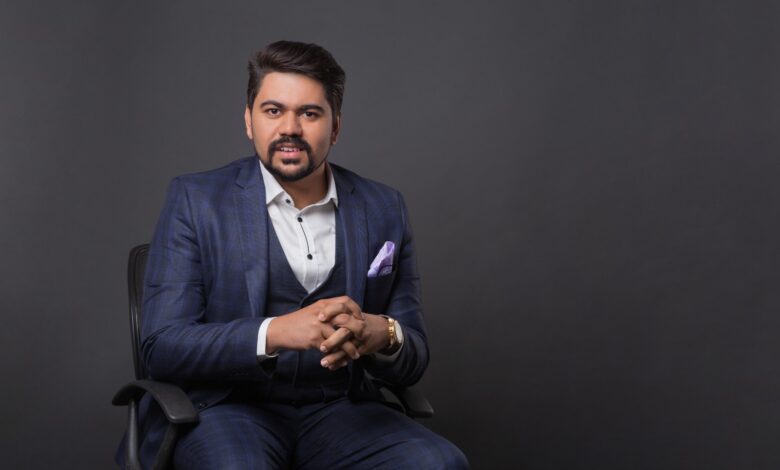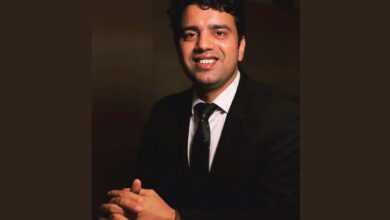VTRO aspires to shape the future of mobility with highly efficient e-Vehicles and an entire ecosystem facilitating necessary services

Give us a brief about your entrepreneurial journey?
I have always been intrigued by the transformational power of technology and how it can enhance our lives if we harness this power in the right way.My love for innovation and tech started right from college days, doing projects for 4th year engineering students. I spent a lot of time doing R&D on various topics, robotics & automation being my favourite. I in fact even taught robotics as a faculty in college. I believe that the core idea for product innovation should seed from the intent to improve or enhance the life of the customer. To do so, one needs to go deep into consumer insights and explore possible solutions to build products that disrupt. I launched Skroman Global, an immensely successful first-generation business offering home automation products – Lock, Curtain motors, Lights, Switches, etc. Today Skroman holds 80% of market in Pune in Home Automation. We then pivoted to EV sector with VTRO in 2020 – and I am excited about the future of EV segment in India.
What were your key learnings at Skroman? How are you leveraging these learnings at VTRO?
My two big learnings at Skroman were, importance of consumer insight in R&D and to always deliver value and experience, not just products. The success of Skroman is testimonial to our belief in consumer centricity. Skroman taught us how to marry consumer insight with R&D to develop disruptive products which we leveraged at VTRO. We saw how consumers made a choice to move from mechanical switches to Skroman and the same insight drives the product innovation at VTRO. Key consumer insight for EV was that the infrastructure is inadequate to support the segment. So, VTRO is focused on developing the EV infra and not only on the EV end product. Battery swapping technology is also another key innovation that aims to solve the pertinent battery issues consumers face with EV. We also invest in developing cost effective yet international quality products, because the evolving consumer today does not only seek functionality-but wants a certain class and enhancement value added to it.
What prompted you to foray into the EV sector?
Sustainability and green energy are the buzzwords today and even we as a society are becoming environment conscious. Even the new-age technology is enabling us to create green products- which is imperative for the future. While EV is the buzzword in the market, very little has been done to raise awareness about it and build the infrastructure to support its demand. Other payers manufactured EV products but did not focus on energy as a service. We saw a clear gap in understanding consumer needs and the potential the sector truly holds if we can create the right ecosystem for users. So we made a foray into EV with the aim to leverage our deep consumer insights and develop services and infrastructure which encourages adoption of EVs and enhances the ease and convenience of users.
How do you see the EV sector shaping up in India? What is your projections for the next 2 – 3 years?
The EV market in India was valued at $800Mn in 2019 which is expected to rise to $7.6Bn by 2026 and touch $20Bn by the end of this decade. This exponential growth is expected to be driven by the evolving consumer demand for sustainable mobility solutions, government-backed incentives and favourable policies to promote green mobility and the development of the EV sector offering better infrastructure and optimal priced products to encourage users to move to EV option. Other key drivers for the EV sector will be the adoption of shared mobility trends such as subscription models and the choice to rent rather than own a mobility, etc which is picking up in India. Subsidies and offers on EVs will also entice buyers while there will also be focus on EV infrastructure projects for many rural areas in India. We will also see a lot of synergy between mobility and technology and newer segment of business such as EV financing, vehicle intelligence system, battery swapping & Battery-as-a-Service and comprehensive charging infrastructure network, which will the focus of VTRO.
Tell us about VTRO and how is it different from peer competition brands?
FundamentallyVTRO offers Energy Solutions rather than focusing only on products. We are also building the infrastructure which includes parking spots, charging stations etc. in order to support the use of EVs and are also offering innovating solutions like battery change /swipe technology to bring convenience and ease to users of EVs. Our aim is to help the country in creating a robust infrastructure and easy access to EVs to all customers.
What is the vision for VTRO?
VTRO visions to mushroom India’s thirst for tailpipe emission-free commute and to contribute towards smart and green nation while providing exceptional quality through the excellence of its service. VTRO aspires to shape the future of mobility with highly efficient e-Vehicles and an entire ecosystem facilitating necessary services, to enable swift and emission free commute.
What is your reaction to the financial budget this year? Was it in line to your expectations?
We are happy with the budget as they supported the growth of EV segment by lowering the customs duty on lithium batteries. The cost of purchasing these batteries will decrease, ultimately leading to lower prices for electric vehicles. This will make EVs more cost-competitive and encourage consumers to adopt them, boosting demand and supporting the government’s green initiatives.
What are the future plans with V-Trio? Any interesting developments in the pipeline?
VTRO is focused on building the infrastructure for EV segment along with developing EV products. We plan to create the entire infra-ecosystem with parking facilities, recharging junctions, battery change/swap stations and other EV products. We already have won the tender from PMC and NMMC for charging/ swapping battery stations and rent a bike solution. A MoU with Maharashtra Metro Rail is also in place. We are setting up a state-of-the-art manufacturing facility in Chakan and want to be present across all major cities of Maharashtra over the next 2-3 years. With VTRO our aim for 2023 is to go live with swapping stations across multiple countries, enabling the new generation Battery pack, which can be connected in parallel with mesh technology to support two-wheeler and three-wheeler together. We also are developing an IOT app which will allow single touchpoint access to all our services.
Does EV have a market beyond the Metro city and Teir1?
I am confident that EVs will have a market beyond the Metros, as we see more infrastructural development happening in the smaller markets. At VTRO our infrastructure framework is like a software application; any EV company can use our VTRO platform to offer services to their customers. We are focusing on offering energy as a service and infrastructure as a service which can be replicated across markets. As there is more awareness and accessibility for EV market in these smaller towns, we will see more demand and adoption happening.
What are the key qualities for becoming a successful entrepreneur?
Patience, hard work and courage are essential virtues for entrepreneurship. One needs to always have confidence in their ideas and try to build unique products rather than being ‘me too’ variety. Have the ability to see long term goals but same time have a firm grip on everyday milestones to make sure business is on track. Always keep learning and develop ability to think out of the box – and when it’s tough; don’t give up.
What is your outlook for 2023? Both business wise and from personal perspective.
We want to focus on developing our infrastructural and software offering to service more companies and in turn help develop more EV-infra in the country. Our efforts are to promote the adoption of EVs and also scale our tech capabilities such that India is less dependent on China for tech hardware or software for EV segment. I personally want to see India shine on the global map as a success story to emulate in the EV and EV service segment.
Define leadership?
Today leadership is the ability to quickly adapt and evolve to stay relevant in the dynamic market scenario. It is more about collaboration rather than delegation. Most millennials are part of the workforce and thus understanding skill sets, interests and interpersonal dynamics becomes critical for a good functioning team.
Mention one high point of your professional carrier and one business lesson you always follow?
I look back at my entrepreneurial journey and there were many high points to celebrate, but I can say launching Skroman at age of 28 and building the business into a successful venture and making it a sought-after consumer brand in a rather new category, is the kind of validation every entrepreneur aspires. Today I am also proud to be an EV consultant in major EV brands in India. My business lesson or belief is, that the core idea for product innovation should seed from the intent to improve or enhance the life of the customer
Tell us more about the Battery swap offering? Is this an innovative offering in the market?
We also developing an IOT app which will allow single touchpoint access to all our services. Using the app, the user can register themselves through an instant KYC verification process. The user then can use the map to see nearest station for battery charge/swap. The user can then reach the station and scan QR code and choose to either charge or swap the battery and they can see the estimated time and cost for the selected option in the app. The user can proceed with the activity and payment will be cut from the VTRO wallet or any UPI connected to the user profile. This concept of battery swapping is not new to the world. It has been around for a few years and has been used in some electric vehicles. For India, it’s a fairly new concept. The idea behind battery swapping is to provide a quick and convenient way to replace a depleted battery with a fully charged one, without the need to wait for a slow charging process.
Explain the benefits of battery charge/swap offering?
The benefits of battery swapping include:
- Faster charging: Battery swapping is much faster than traditional charging methods and can take just a few seconds.
- Increased driving range: A fully charged battery can provide a longer driving range, making it ideal for long-distance trips.
- Convenient: Battery swapping stations are strategically located, making it convenient for EV owners to exchange their batteries.
- Cost-effective: Battery swapping can be more cost-effective than traditional charging methods, as it eliminates the need for expensive charging equipment.
- Reduced dependence on grid-based charging: With battery swapping, EVs can be charged anywhere and at any time, reducing the dependence on grid-based charging.
- Increased vehicle uptime: With battery swapping, EVs can continue to operate even if their batteries are depleted, reducing downtime.
The benefits of charging include:
- Convenient charging options: With the growth of the EV charging infrastructure, charging an EV is becoming more convenient, with charging stations available in more and more locations.
If not an entrepreneur, what would you be?
I would be a quirky maverick inventor similar to the character of Phansuk Wangdu from the movie, 3 Idiots! All iz Well.





